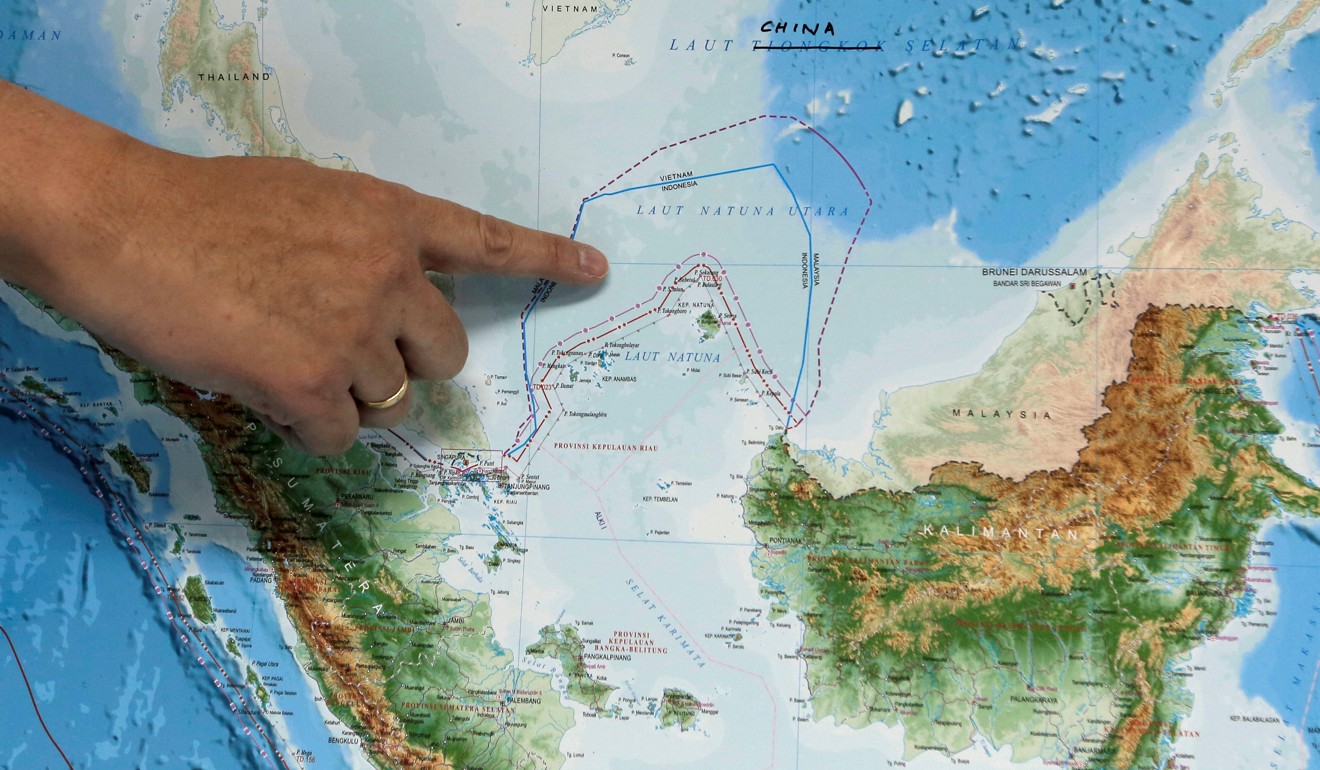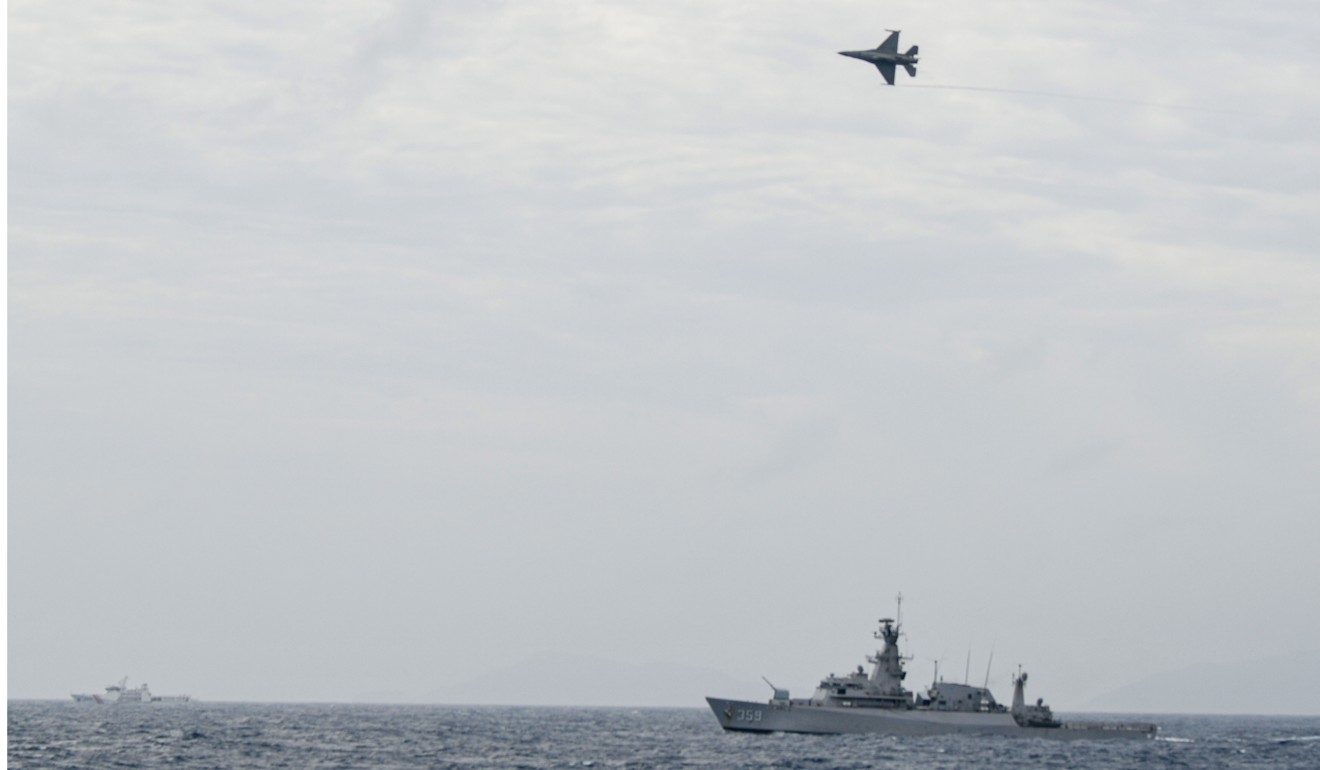
Why fishing boats are on the territorial front lines of the South China Sea
- A stand-off between China and Indonesia near the Natuna Islands highlights the growing role civilian fishing fleets play in national claims
- The deployments are dimming hopes for a code of conduct in the troubled waters, observers say

Tensions may have eased between China and Indonesia after yet another stand-off over fish-rich waters in the South China Sea but fishing fleets remain at the core of the heated territorial dispute.
The Natuna Islands off the coast of Borneo are administered by Indonesia but the waters near the archipelago are claimed by China as part of its traditional fishing grounds.
Beijing apparently sought to underscore its point when Chinese fishing boats escorted by a Chinese coastguard vessel went into the area in mid-December, prompting a protest from Jakarta and a promise that it would send around 120 fishermen to the waters to consolidate its control.
On Thursday, a day after Indonesian President Joko Widodo made a high-profile visit to a military base in the islands, Indonesia’s armed forces confirmed that the Chinese vessels had left the area.
But while the risk of immediate conflict has receded, fishing vessels from both countries continue to lurk, making hopes for a maritime code of conduct for the area and the wider South China Sea even more unlikely, observers say.

As one of the world’s most important fisheries, the South China Sea has long been a battlefield, with littoral states using their fishermen to expand fishing grounds and simultaneously exert maritime dominance.
Fishing in the South China Sea, which China said had been carried out by its fishermen for centuries, has been cited as among Beijing’s key evidence for its “nine-dash line” claims of nearly all of the South China Sea and the resources within the area, though an international tribunal in The Hague ruled in 2016 that there was “no legal basis” behind China’s historic rights.
China and the 10-member Association of Southeast Asian Nations (Asean) started talks for a code of conduct in 2002, aiming to regulate dangerous behaviour and prevent an outbreak of hostilities in the disputed waters. A single draft of the code was first put forth in August 2018 but it was never made public. Nevertheless, Beijing and Asean have agreed to finalise the negotiations by next year.
Ding Duo, a researcher at the Chinese government-backed National Institute for South China Sea Studies in Hainan, said the fishing disputes reflected broad differences between China and Indonesia over rights.
“Indonesia believes the islands belong to their economic exclusive zone but China says the area is part of its traditional fishing grounds and has the right to assert its claims,” Ding said.
He said players in the region needed to agree on a code of conduct to settle fishing disputes to ensure they did not erupt into a bigger conflict.
“For example, there should be some restraint on the number of fishing boats and the scale of fishing in the disputed waters. Law-enforcement activities should also be regulated,” Ding said.
“Otherwise it would not only intensify tensions but also escalate normal fishing disputes into serious political issues.”

The issue is growing in importance as dwindling stocks in China’s near-shore waters and booming domestic demand for seafood propel Chinese fishermen further from home shores.
For Beijing, sending fishing fleets to areas like the Natuna Islands helps not only to satisfy the domestic appetite for seafood but also to maintain a presence in the waters at a lower risk.
Compared with constructing oil rigs or forcibly taking over disputed islands, a build-up of fishing fleets is less expensive and easier to control, according to Zheng Zemin, from Hainan Normal University.
President Xi Jinping highlighted the importance of China’s fishing fleets in April 2014, when just weeks after taking office, he visited the coastal village of Tanmen in southern Hainan, calling on fishermen to “build bigger ships, venture to bigger seas and catch bigger fish”.
The residents of the country’s southernmost fishing village responded by saying that they would do whatever they could to protect the “sea of ancestors”.
Beijing has since stepped up support for the fishermen, subsidising construction of bigger, steel-hulled trawlers operating around the contested Spratly Islands. It has also consolidated, expanded and better equipped the coastguard fleet to back up the fishermen.
Other claimants, including Vietnam, Malaysia, the Philippines, Brunei and Taiwan, are adopting the strategy. Vietnam, the most vocal critic of China’s extensive claims in the South China Sea, passed a long-term plan in 2018 to strengthen its fishing fleet by 2030.
The approach adds up to confrontations between vessels at sea.
In 2016, the Indonesian navy said it fired warning shots at Chinese fishing boats accused of operating illegally near the Natunas. Beijing said one boat was damaged and one person was shot and wounded in the incident.
Indonesia also came to blows with Vietnam in April when a Vietnamese coastguard ship rammed an Indonesian navy warship after it captured a Vietnamese fishing boat in the waters.
Indonesia detained 12 Vietnamese fishermen from the boat, which sank in the clash, and summoned the Vietnamese ambassador to protest. Jakarta later said that it had sunk 51 fishing boats, mostly from Vietnam, since the attack.
Zhang Mingliang, a specialist in Southeast Asian affairs at Jinan University in Guangzhou, said it was becoming increasingly common for claimants to use their fishing fleets to claim their maritime interests and jockey for position in the code of conduct negotiations.
But while fishing disputes were expected to grow, none were expected to expand into regional conflicts, he said.
“Both sides have refrained from using powerful weapons, limiting themselves to flexing military muscle,” Zhang said.
Purchase the China AI Report 2020 brought to you by SCMP Research and enjoy a 20% discount (original price US$400). This 60-page all new intelligence report gives you first-hand insights and analysis into the latest industry developments and intelligence about China AI. Get exclusive access to our webinars for continuous learning, and interact with China AI executives in live Q&A. Offer valid until 31 March 2020.